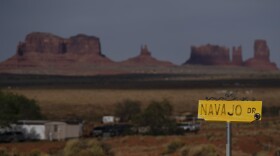-
The FBI is sending extra agents, analysts and other personnel to field offices in 10 states over the next six months to help investigate unsolved violent crimes in Indian Country.
-
Some believe lawmakers don’t see the need to codify it after the U.S. Supreme Court decided the federal ICWA was constitutional.
-
Despite bipartisan support, Utah’s initial version of the federal Indian Child Welfare Act failed to pass in 2023. Now, it’s returning for the 2025 legislative session.
-
About 32% of Navajo homes still have no electricity. Before the pandemic, Lorraine Black and Ricky Gillis filed the needed paperwork to get power. Nearly five years later, the couple’s mobile home in rural Halchita, Utah, was finally connected to the grid.
-
For decades, the government-run boarding school system forcibly separated Indian children from their parents. The president called it a “blot on American history” in his first visit to Indian Country.
-
Biden is preparing to issue an historic apology during his first diplomatic visit to a tribal nation as president on Friday. The Indian boarding school system devastated the lives of generations of Indigenous children and their ancestors.
-
The Radiation Exposure Compensation Act (RECA) wasn’t renewed by Congress earlier this year. Many people are still dealing with the health and financial effects of nuclear testing, and several Tribes traveled to Washington, D.C., in September to let lawmakers know about their concerns.
-
Writer and director Sydney Freeland hopes Native audiences see themselves in her basketball tale of tragedy and triumph.
-
Bears Ears National Monument in southeast Utah has been at the center of political fights over public land in recent years. The upcoming presidential election threatens to continue escalating that tug-of-war.
-
The adoption made by David and Chelom Leavitt isn’t a one-off. An investigative report into the case revealed problems in how the Indian Child Welfare Act is enforced.
-
Tribal President Buu Nygren on Tuesday ordered Navajo police to set up roadblocks on federal highways and turn back any trucks carrying uranium.
-
Many Native Americans in Utah who want to become a therapist have not been able to pass the final exam. But state lawmakers made a big change this year — as of May, prospective therapists no longer have to pass that test to get licensed.
Play Live Radio
Next Up:
0:00
0:00
Available On Air Stations












